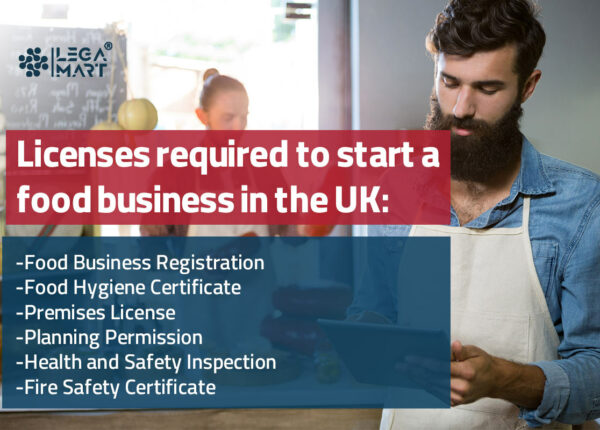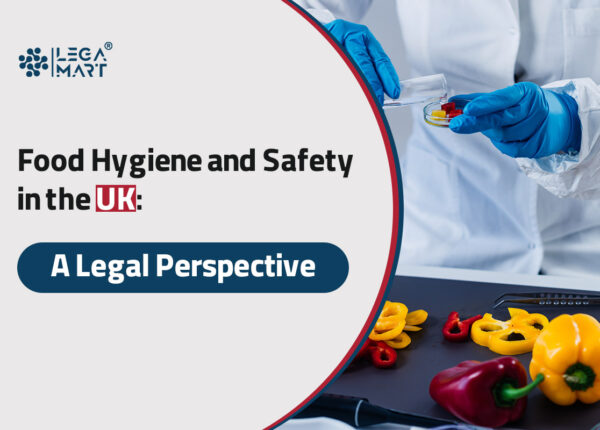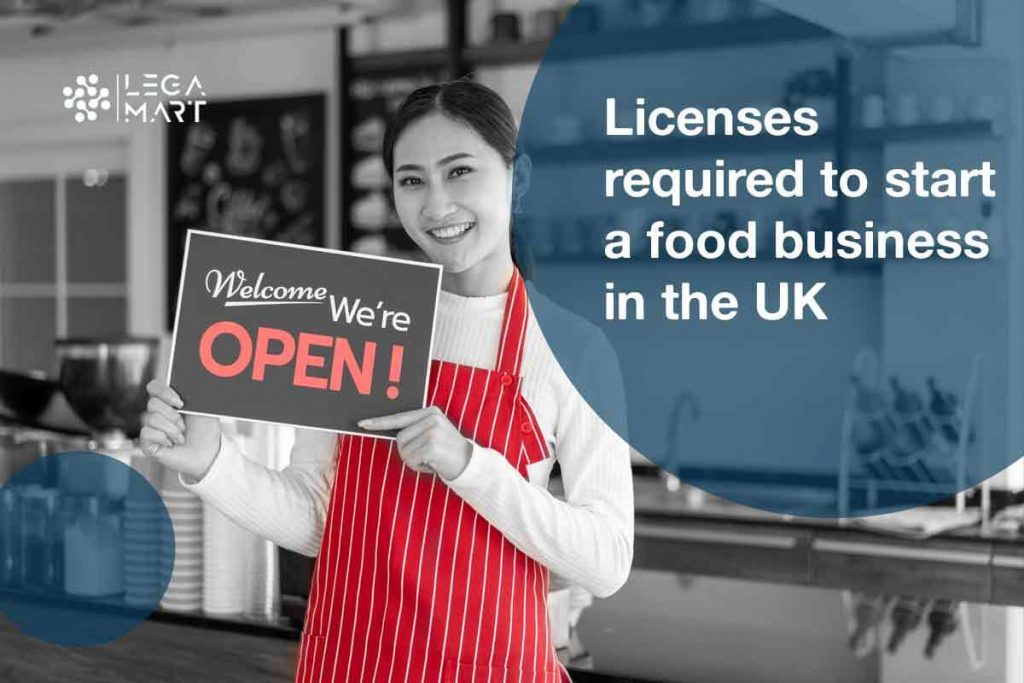Introduction
Starting a food business in the UK can be an exciting opportunity, but you must understand the various licenses required to start a food business and the regulations you must comply with before getting started. As of 2023, revenue in the food market amounts to US$164.40 billion, which is further expected to grow by 4.02% in 2023-28. This highlights the growing number of entrepreneurs and businesses entering the food industry. However, with this growth comes increased regulatory scrutiny and legal challenges, particularly around compliance and food safety.
A survey conducted by Food Standards Scotland found that nearly 40% of food businesses in Scotland were not fully compliant with food safety regulations. This underscores the importance of ongoing legal and compliance support for food businesses.
Furthermore, a study by the insurance company, NFU Mutual, found that over 60% of small food businesses in the UK do not have the necessary insurance coverage to protect themselves from legal claims. This highlights the need for legal and compliance management services, such as those offered by LegaMart, to help businesses mitigate risk and avoid costly legal issues.
What Businesses Need a Food Licence?
If you are embarking on a new venture in the food industry or have recently acquired an existing food-related business, obtaining the necessary food license is imperative. A food-related enterprise encompasses any operation engaged in preparing, cooking, handling, storing, distributing, or supplying food.
Registration criteria apply to enterprises like:
- Restaurants
- Market stalls and various general food stalls
- Companies engaged in food distribution, irrespective of whether food is stored on-site
- Mobile catering businesses, such as food delivery vans
In essence, if your business is involved with food in any capacity, assessing whether you must comply with registration prerequisites is advisable.
Licenses Required to Start a Food Business in the UK

Whether you’re planning to run a small café or open a large restaurant, here are some of the key licenses required to start a food business:
Food business registration
Any business selling food or drink must be registered with the local council at least 28 days before opening. This registration is free and can be done online. This is required for all food businesses operating in the UK. The relevant law is the Food Safety and Hygiene (England) Regulations 2013. To register, you must provide the local authority with your business details, including your contact information, food activities, and premises details.
To register as an FBO, you must provide your local authority with your business details, including your contact information, food activities, and premises details. You can register online or by contacting your local council’s environmental health department. Registration is free; you must do this at least 28 days before starting your business. After you register, the council will inspect your premises to ensure you comply with food safety and hygiene regulations.
Food hygiene certificate
This formal document serves as evidence to health inspectors, confirming that you have completed a state-approved food handler training course and possess comprehensive knowledge of food safety principles.
All food handlers must have a Food Hygiene Certificate, demonstrating that they understand how to handle food safely and prevent contamination. The certificate can be obtained through a course or training program, which is essential for anyone working in a food business.
Food Premise Approval (England)
Apart from the strictly vegan restaurants, all restaurants must secure a premises license. It is mandatory for you to secure a premises license if your business is involved in meat, fish, egg, or dairy products. However, this license is not required to be secured if you sell directly to the public or retailers, such as caterers, pubs, and restaurants, as long as the following conditions are met:
- food is less than 25% of your trade
- you do not handle any wild game meat products
- you do not sell food outside the county your business is registered in
This license is also essential for someone who wishes to sell outside the country that they are registered in. To apply for this license, you are required to contact your council for the application or make a direct online application. The application process can be lengthy, so planning is essential.
Premises License
This license is especially important for pub and bar owners. If you plan to sell alcohol alongside your food or intend to serve hot food and drinks apart from the standard restaurant operating hours, you’ll need a premises license. The following are some licensable activities which are included under this license:
- Serving hot food and drinks between 11 pm and 5 am
- Theatrical performances
- Film shows
- Indoor sporting events
- Indoor or outdoor boxing or wrestling
- Live and recorded music or facilities for making music
- Dance or dancing facilities
You are required to obtain a license for the above activities, irrespective of whether these activities are for charity or not.
However, you are not required to obtain any license for the following types of entertainment:
- educational or promotional films
- films shown as part of an exhibition in a museum or gallery
- incidental music (live or recorded)
Considering that the license is mainly important for pub and bar owners, you are required to be above 18 years old to apply for a premises license. Further, you are required to appoint or become a designated premises supervisor (DPS) while applying for this license, and the DPS must have a personal license to sell alcohol.
Both the premise license and personal license are granted by the local council and allows you to sell alcohol on your premises. The fee for the license is based on the rateable value of the property and generally ranges from £100 to £1,905. If your premise has no rateable value, the cost will fall into the lowest fee band.
Events License
This license is important for businesses which serve alcohol on special occasions or events but not regularly. Whenever you are expected to conduct an event where you are likely to serve alcohol, you are required to make an application for a Temporary Event Notice (TEN) at least 10 days before holding such an event. This license covers everything mentioned in the Food Premises Approval license but on a temporary basis.
However, ensure that you take note of the following restrictions before making an application:
- Your event must have fewer than 500 people at all times – including staff running the event
- Your event must last no more than 168 hours (7 days)
It is possible to receive up to 5 TENs per year. However, if you have a personal license available, this number may be increased up to 50 TENs per year. Further, a single premise cannot have more than 20 TENs in one year, so long as the total event length is not more than 26 days.
Planning Permission
If you plan to make significant changes to the layout or use of your premises, you may need to obtain planning permission from the local council. This is particularly important if you’re planning to make changes to a listed building or a building in a conservation area.
Music License
Most restaurants tend to play music to keep their environment lively and the customers hooked. In such a case, you are required to make an application to obtain a music license from the PPL PRS, which is a music licensing company in the UK. This license is essential for reimbursing the owners and performers of the track for its use in the restaurant. Alternatively, it is possible to go forward with royalty-free music. However, it might be difficult for you to find a suitable tracklist in accordance with the theme and ambience of your restaurant. Therefore, make your choice smartly.
Health and Safety Inspection
Before opening your food business, you’ll need a health and safety inspection from your local council. This inspection will check that your premises meet specific health and safety standards, and it’s vital to ensure that everything is in order before you open.
Fire Safety Certificate
If your premises are large or have high occupancy, you may need a Fire Safety Certificate. This certificate is granted by the local fire service and demonstrates that your premises meet fire safety standards.
Food Hygiene and Safety in the UK: A Legal Perspective

Food hygiene and safety are paramount to the health and well-being of the public, and as such, the UK has strict legal requirements to ensure that food is safe to eat. The legal framework governing food hygiene and safety in the UK is complex and comprehensive, covering everything from the production and processing of food to its distribution and sale. This article will provide an overview of the key legal requirements governing food hygiene and safety in the UK.
The Food Safety Act of 1990
The Food Safety Act 1990 is the cornerstone of UK food safety legislation. The Act sets out the legal obligations of food businesses, including food producers, processors, distributors, and retailers, to ensure that the food they provide is safe to eat. In addition, the Act establishes a system of food safety controls, including the requirement for food businesses to implement a system of hazard analysis and critical control points (HACCP) to identify and manage potential food safety hazards.
Food Hygiene Regulations
The Food Hygiene Regulations are a set of regulations that govern the production and processing of food in the UK. The regulations set out specific requirements for food businesses, including implementing appropriate food hygiene procedures, maintaining a clean and hygienic environment, and ensuring that all food is stored, handled, and transported safely.
Food Standards Agency
The Food Standards Agency (FSA) is the UK’s independent food safety regulator. The FSA is responsible for enforcing food safety legislation, conducting inspections and investigations, and issuing guidance to food businesses on best practices for ensuring food hygiene and safety. The FSA also maintains a database of food safety alerts, recalls, and withdrawals to help protect the public from potential food safety hazards.
Food Labelling Requirements
In addition to food hygiene and safety requirements, UK food businesses must also comply with strict labelling requirements. Food labels must provide clear and accurate information about the ingredients used in the food, any potential allergens, and nutritional information. Failure to comply with these requirements can result in legal action, including fines and imprisonment in severe cases.
Advertising And Marketing Regulations
Food businesses in the UK must follow advertising and marketing regulations when promoting their products to consumers. These regulations are in place to ensure that advertising is truthful, accurate, and not misleading. For example, food businesses cannot make false or exaggerated claims about the health benefits of their products or use deceptive packaging to make their products appear healthier.
Additionally, advertising must not target children in a way that exploits their inexperience or vulnerability. By adhering to these regulations, food businesses can maintain the trust of their customers and ensure that they are not misinformed about the products they are consuming.
Common Legal Claims for Food Businesses in the UK
Running a food business in the UK can be challenging, and one of the biggest challenges facing food businesses is the risk of legal claims. Food businesses face a range of potential legal claims, including claims for food poisoning, allergic reactions, and breaches of food safety regulations. In this article, we will provide an overview of the common legal claims that food businesses in the UK may face.
Food Poisoning Claims
Food poisoning is a common issue facing food businesses in the UK, and it can lead to legal claims from customers who become ill after eating contaminated food. Food businesses can be held liable for food poisoning if they fail to implement appropriate food safety procedures or if they serve contaminated food. Customers who become ill after eating contaminated food may be able to bring a legal claim against the food business for compensation.
Allergic Reaction Claims
Food businesses in the UK must take the risk of allergic reactions seriously, as customers with allergies may suffer severe reactions if they consume food that contains allergens. Food businesses must ensure that they provide clear and accurate information about the ingredients in their food, including any potential allergens. Failure to provide this information can result in legal claims from customers who suffer allergic reactions after consuming food from the business.
Breach of Food Safety Regulations Claims
Food businesses in the UK must comply with various food safety regulations, including the Food Safety Act 1990 and the Food Hygiene Regulations. Failure to comply with these regulations can result in legal claims from customers or regulatory bodies. Food businesses can be held liable for breaches of food safety regulations if they fail to implement appropriate food safety procedures, maintain a clean and hygienic environment, or ensure that all food is stored, handled, and transported safely.
Product Liability Claims
Food businesses may also face product liability claims if their products are found to be defective or dangerous. Product liability claims can arise if food businesses sell contaminated food containing foreign objects or otherwise unfit for consumption. In addition, customers who are injured or become ill after consuming a defective product may be able to bring a legal claim against the food business for compensation.
Conclusion
To summarise, launching a successful food business in the UK involves navigating complex legal requirements and obtaining necessary licenses. Failure to comply with these legal obligations can result in significant penalties and legal action. Seeking expert legal advice from reputable online legal platforms like LegaMart can be instrumental in ensuring full compliance with all relevant laws and regulations. Their directory of vetted lawyers provides businesses with comprehensive legal support, helping them establish themselves as reputable and trustworthy enterprises in the highly competitive UK food industry.
Frequently asked questions
Do I need a certificate to sell food from home?
Yes, if you are operating a home-based catering business or generating income from food prepared at home, you must ensure its safety and compliance with regulations. This step is crucial because it assures your customers that you are committed to ensuring their safety. This includes obtaining a Level 2 Food Safety and Hygiene for Catering certificate if you prepare and distribute the food yourself. Even if you’re selling pre-packaged food, it’s recommended to undergo this training to maintain food safety and demonstrate compliance with local authorities.
Do you need to register your food business in the UK?
Registering your food business establishment is mandatory and must be completed at least 28 days before commencing your operations. This registration is a legal obligation and cannot be declined. It applies to all enterprises involved in storing, selling, distributing, or preparing food and beverages. Upon submitting a duly signed food business registration form, you are authorized to initiate your business activities.
Who needs to register their food premises?
If you run a food business, you must inform the authorities about the places you use for food storage, sales, distribution, or preparation. This includes restaurants, hotels, cafes, shops, warehouses, delivery vehicles, and more. If you use vehicles alongside permanent premises, you only need to report the total number of vehicles to the local authority. But if you have vehicles without permanent premises, you must specify where they’re usually kept.
However, Some food-related activities are exempt from registration because they do not fall under EC Regulation. These exemptions include growing or producing food for private domestic use, like raising chickens to provide eggs for your family, and domestic food preparation, handling, or storage for private domestic consumption.




